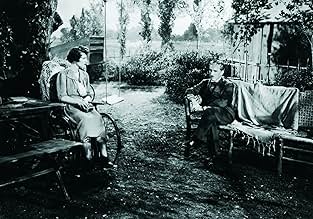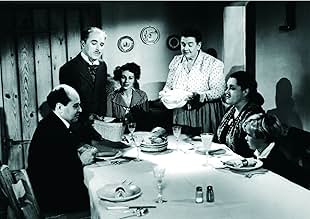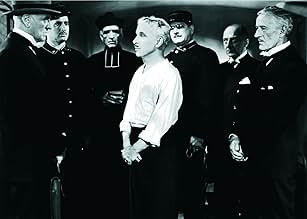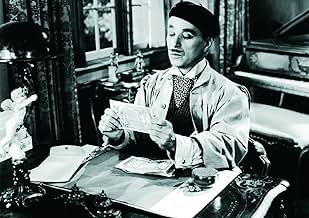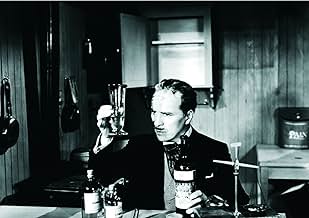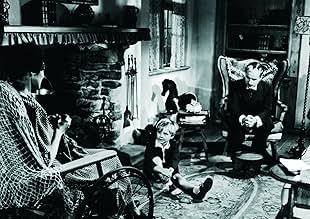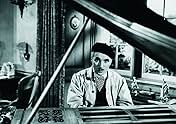Monsieur Verdoux
- 1947
- Tous publics
- 2h 4min
NOTE IMDb
7,8/10
20 k
MA NOTE
Un homme suave mais cynique fait vivre sa famille en épousant de riches femmes qu'il assassine pour leur argent, mais le job comporte des risques professionnels.Un homme suave mais cynique fait vivre sa famille en épousant de riches femmes qu'il assassine pour leur argent, mais le job comporte des risques professionnels.Un homme suave mais cynique fait vivre sa famille en épousant de riches femmes qu'il assassine pour leur argent, mais le job comporte des risques professionnels.
- Réalisation
- Scénario
- Casting principal
- Nommé pour 1 Oscar
- 6 victoires et 1 nomination au total
Ada May
- Annette - Her Maid
- (as Ada-May)
Bernard Nedell
- Prefect of Police
- (as Bernard J. Nedell)
Avis à la une
This movie is a fine example of a genre which attained enormous popularity during and in the decade after World War Two. These so-called "black comedies" (a term perhaps alluding to the funereal subject matter, ranging from fluffy (Noel Coward's "Bithe Spirit" - on stage in 1941, filmed in 1945) to darkly absurd (Ealing's "The Ladykillers" in 1955), turned death into situation comedy. Falling out of favour in the 60s, black comedy returned somewhat in the work of Robert Altman, before being brought back to full glory by the Coen Brothers.
Although the most enduringly successful example of black comedy is perhaps "Arsenic and Old Lace" (stage 1941/film 1944), two of the very greatest filmmakers blessed it with their contributions. Alfred Hitchcock to some extent incarnated the essence of it every time he introduced an episode of "Alfred Hitchcock Presents", but his definitive statement - "The Trouble with Harry" - just preceded the TV shows in 1955.
Charles Chaplin's dark vision, "Monsieur Verdoux", was released in 1947, just before the anti-Communist cries against him were to drive him out of America. A political backdrop is either entirely absent or implicit in the other examples of the genre I've mentioned, but Chaplin makes it explicit, and some might say that, to some extent, this unbalances the last reel of an otherwise utterly brilliant film. Others perhaps will be more sympathetic to the historical context. For me, while completely supporting Chaplin's observations concerning the business of war, the heavy underlining of his message does seem a flaw when viewing the film today.
All the same, "Monsieur Verdoux" is a magnificent achievement, not least in its wonderful gallery of characters, many played by character actors rarely seen on screen. Two in particular stand out, both playing wives of the much-married Verdoux: dour, unsmiling Margaret Hoffman, who goes to her death in an extraordinary scene of darkness followed by sudden light; and Martha Raye, in her best cinematic role, as the wife Verdoux fails to kill. Raye is such an explosion of energy and personality that the screen can barely contain her. To watch her and Chaplin in their scenes together is sheer joy.
The script is witty, the photography excellent, and Chaplin's penchant for sentimentality is held well in check. It is, except for the end, an unusually subtle movie, its tone completely in keeping with its French setting.
Although the most enduringly successful example of black comedy is perhaps "Arsenic and Old Lace" (stage 1941/film 1944), two of the very greatest filmmakers blessed it with their contributions. Alfred Hitchcock to some extent incarnated the essence of it every time he introduced an episode of "Alfred Hitchcock Presents", but his definitive statement - "The Trouble with Harry" - just preceded the TV shows in 1955.
Charles Chaplin's dark vision, "Monsieur Verdoux", was released in 1947, just before the anti-Communist cries against him were to drive him out of America. A political backdrop is either entirely absent or implicit in the other examples of the genre I've mentioned, but Chaplin makes it explicit, and some might say that, to some extent, this unbalances the last reel of an otherwise utterly brilliant film. Others perhaps will be more sympathetic to the historical context. For me, while completely supporting Chaplin's observations concerning the business of war, the heavy underlining of his message does seem a flaw when viewing the film today.
All the same, "Monsieur Verdoux" is a magnificent achievement, not least in its wonderful gallery of characters, many played by character actors rarely seen on screen. Two in particular stand out, both playing wives of the much-married Verdoux: dour, unsmiling Margaret Hoffman, who goes to her death in an extraordinary scene of darkness followed by sudden light; and Martha Raye, in her best cinematic role, as the wife Verdoux fails to kill. Raye is such an explosion of energy and personality that the screen can barely contain her. To watch her and Chaplin in their scenes together is sheer joy.
The script is witty, the photography excellent, and Chaplin's penchant for sentimentality is held well in check. It is, except for the end, an unusually subtle movie, its tone completely in keeping with its French setting.
A satire on a serial killer is not your everyday movie fare. I can see why audiences of that day were turned off by the Little Tramp's sudden homicidal turn. Of course, it's all treated with a light comedic hand until the moralizing end. Still, Chaplin's subtext comes through clearly at certain points-, such that unemployment can drive men to extremes when they've got a family to support.
On the other hand, not every man, of course, turns to fleecing rich widows and then dispatching them in cold-blooded fashion. But that brings him to his second point--- namely "numbers sanctify". Kill one person and you're a murderer; kill a thousand and you're a hero. Here it appears he's referring to the state that historically kills by the thousands in the name of the patriotism. Remember, the movie's coming right after the close of the horrific WWII, and he finds the point ironic.
But Verdoux's not through. Capitalism is indirectly indicted for its periodic booms and busts that lead to joblessness, and millions upon millions for munitions manufacturers who prosper during wartime. As for the consolations of religion that come at the end, the gentleman killer appears indifferent without being insulting. Since Chaplin's the sole screenwriter, it's no stretch to believe he's speaking for himself on these matters. Given this rather wholesale indictment of many of the West's leading institutions, small wonder he left the country shortly after under a cloud of controversy.
Nonetheless, the movie hits its comedic highpoints with Martha Raye as the loudly vulgar Annabella. Try as he does to do her in, she manages to comically thwart him at every turn. That scene in the fishing boat's a classic. All his polished charm and oily flattery just slide by her obnoxious silliness. Raye makes a perfect foil and an inspired piece of casting.
Of course, some of the beguiling Little Tramp remains in Verdoux's character, as when he befriends the penniless girl (Nash), or in that supremely ironic moment when he ambles Tramp-style toward the guillotine. All in all, it's a strange little movie that was apparently shelved for years for obvious reasons. Nonetheless, it was rather gutsy for Chaplin to take such chances with his established character and at Cold War's outset. It's fairly humorous until you think about its serious points, which are still worth pondering.
On the other hand, not every man, of course, turns to fleecing rich widows and then dispatching them in cold-blooded fashion. But that brings him to his second point--- namely "numbers sanctify". Kill one person and you're a murderer; kill a thousand and you're a hero. Here it appears he's referring to the state that historically kills by the thousands in the name of the patriotism. Remember, the movie's coming right after the close of the horrific WWII, and he finds the point ironic.
But Verdoux's not through. Capitalism is indirectly indicted for its periodic booms and busts that lead to joblessness, and millions upon millions for munitions manufacturers who prosper during wartime. As for the consolations of religion that come at the end, the gentleman killer appears indifferent without being insulting. Since Chaplin's the sole screenwriter, it's no stretch to believe he's speaking for himself on these matters. Given this rather wholesale indictment of many of the West's leading institutions, small wonder he left the country shortly after under a cloud of controversy.
Nonetheless, the movie hits its comedic highpoints with Martha Raye as the loudly vulgar Annabella. Try as he does to do her in, she manages to comically thwart him at every turn. That scene in the fishing boat's a classic. All his polished charm and oily flattery just slide by her obnoxious silliness. Raye makes a perfect foil and an inspired piece of casting.
Of course, some of the beguiling Little Tramp remains in Verdoux's character, as when he befriends the penniless girl (Nash), or in that supremely ironic moment when he ambles Tramp-style toward the guillotine. All in all, it's a strange little movie that was apparently shelved for years for obvious reasons. Nonetheless, it was rather gutsy for Chaplin to take such chances with his established character and at Cold War's outset. It's fairly humorous until you think about its serious points, which are still worth pondering.
A brilliant and funny film. Some have even called this Chaplin performance the greatest acting in the history of film. This film came out long before the term serial killer was even a thing. Here the term is mass killer, and it's also hard to argue with his character's assessment that governments of the world are truly the biggest of all mass killers, (Now referred to as serial killers.). In typical Chaplin fashion, this film often challenges and questions the integrity of various powers/authorities and even capitalism itself. Truly though this is sort of a sweet film at it's heart, as most Chaplin films are. A dark comedy with heart, but in truth I feel this film is much more than a dark comedy. There is a much grander subtle narrative in this film. Many a well known critic even have often drastically underrated the writing, the in fact brilliant storytelling of Chaplin. He was in truth one of the first great master storytellers in the history of film, and he really doesn't often get the credit he deserves in this regard. He is more known for his comedic brilliance and comedic writing, but overall the man was extremely brilliant and talented beyond measure. Storytelling itself was really Chaplin's greatest talent in my view. Not just in the comedic sense, but in an intellectual sense. To me, this is definitely an intellectual film even much more than it is a dark comedy, and overall one of Chaplin's greatest films.
"Despair is a narcotic. It lulls the mind into indifference." - Henri Verdoux (Chaplin)
If you like mature classic films at all, then you definitely should see Monsieur Verdoux. It's simply a brilliant piece of 1940's art. 9/10.
"Despair is a narcotic. It lulls the mind into indifference." - Henri Verdoux (Chaplin)
If you like mature classic films at all, then you definitely should see Monsieur Verdoux. It's simply a brilliant piece of 1940's art. 9/10.
The word "Bluebeard" ("Landru" in French) has been a part of the American vernacular for some time now, synonymous with the term "wife-killer." Several variations of the infamous Parisian charmer who married then buried have been filmed over the decades - some OK, others not. John Carradine starred in a respectable but unheralded version in the mid-30s as a puppeteer-turned-perpetual strangler. A so-so French/Italian co-production in 1962 starring Charles Denner and Michele Morgan strove for dark comedy but ultimately lacked the creative spark. The worst of the lot was a wretched Richard Burton/Raquel Welch/Joey Heatherton rehash in the 70s, the nadir of Burton's screen career.
It seems most fitting then that the wry, comic genius of Charlie Chaplin, our beloved "Little Tramp," is allowed to put its delightfully macabre spin on the Bluebeard tale with 1947's "Monsieur Verdoux," winding up with perhaps the most entertaining version yet. First and foremost, it is a pleasure to hear Charlie talk. I also venture to say this is the best of his sound-era films, well-mounted and shot meticulously in black and white, in which he not only produced and directed but provided the music. Who but the loveable Chaplin, with that ever-present tinge of pathos, could play the role of a methodical, unrepentant human wife-disposal who kills purely for financial reward, and have the audience rooting for him!
Our titular hero is a charming fop of a fellow who operates his deadly deception by a precise timetable - he fastidiously charms, marries and eliminates his unsuspecting victims with keen attention paid to banker's hours! But it's Monsieur Verdoux's motive that gains the viewer's empathy. Our boy is not the mad, demented, twisted, cold-hearted monster one must think. He carries out his dastardly deeds out of selfless need. His out-of-town "business" is conducted solely in order to support and tend to his wheelchair-bound wife, a hopeless cripple and invalid, and family. His devotion, in fact, is so honorable, he succeeds in wrapping you around his little wedding finger. As much as you sympathize for the dowagers he does in, you can't help but think at least the old dears died having been graced by such a noble gentleman.
Brash loudster Martha Raye, often considered a bust in films for being intolerably larger-than-life, has one of her best roles here, grabbing her share of laughs as one of Verdoux's intended victims - a shrill, obnoxious, but verrrry wealthy dame whom nobody would really mind seeing knocked off. The problem is Charlie can't seem to off her! Every industrious attempt fails miserably. In one truly madcap scene that directly parodies Theodore Dreiser's classic novel "An American Tragedy," Charlie takes Martha, outlandishly bedecked in silver fox furs, out on a crude fishing boat excursion in the hopes of drowning the tenacious harridan. Two comic masters in vintage form.
Of course, Charlie does get his comeuppance but its all done in grand, sophisticated style. The whole movie is, in fact, so precise and polished that one must forgive him, given his controversial "subversive" leanings at the time, for tacking on an interminable, out-of-character piece of political diatribe at the finishing line. The movie's theme and bitter irony did not even pretend to disguise his great personal anguish and bitterness at America when political conservatives were breathing down his neck. Forgiven he is, for this black comedy, a sublime, eloquent retread of an old familiar creeper, comes off refreshingly original.
It seems most fitting then that the wry, comic genius of Charlie Chaplin, our beloved "Little Tramp," is allowed to put its delightfully macabre spin on the Bluebeard tale with 1947's "Monsieur Verdoux," winding up with perhaps the most entertaining version yet. First and foremost, it is a pleasure to hear Charlie talk. I also venture to say this is the best of his sound-era films, well-mounted and shot meticulously in black and white, in which he not only produced and directed but provided the music. Who but the loveable Chaplin, with that ever-present tinge of pathos, could play the role of a methodical, unrepentant human wife-disposal who kills purely for financial reward, and have the audience rooting for him!
Our titular hero is a charming fop of a fellow who operates his deadly deception by a precise timetable - he fastidiously charms, marries and eliminates his unsuspecting victims with keen attention paid to banker's hours! But it's Monsieur Verdoux's motive that gains the viewer's empathy. Our boy is not the mad, demented, twisted, cold-hearted monster one must think. He carries out his dastardly deeds out of selfless need. His out-of-town "business" is conducted solely in order to support and tend to his wheelchair-bound wife, a hopeless cripple and invalid, and family. His devotion, in fact, is so honorable, he succeeds in wrapping you around his little wedding finger. As much as you sympathize for the dowagers he does in, you can't help but think at least the old dears died having been graced by such a noble gentleman.
Brash loudster Martha Raye, often considered a bust in films for being intolerably larger-than-life, has one of her best roles here, grabbing her share of laughs as one of Verdoux's intended victims - a shrill, obnoxious, but verrrry wealthy dame whom nobody would really mind seeing knocked off. The problem is Charlie can't seem to off her! Every industrious attempt fails miserably. In one truly madcap scene that directly parodies Theodore Dreiser's classic novel "An American Tragedy," Charlie takes Martha, outlandishly bedecked in silver fox furs, out on a crude fishing boat excursion in the hopes of drowning the tenacious harridan. Two comic masters in vintage form.
Of course, Charlie does get his comeuppance but its all done in grand, sophisticated style. The whole movie is, in fact, so precise and polished that one must forgive him, given his controversial "subversive" leanings at the time, for tacking on an interminable, out-of-character piece of political diatribe at the finishing line. The movie's theme and bitter irony did not even pretend to disguise his great personal anguish and bitterness at America when political conservatives were breathing down his neck. Forgiven he is, for this black comedy, a sublime, eloquent retread of an old familiar creeper, comes off refreshingly original.
A suave but cynical man (Charles Chaplin) supports his family by marrying and murdering rich women for their money, but the job has some occupational hazards.
This film is brilliant, because it is not just entertaining, but also has a strong message. On the surface, it is a man who marries women and kills them in order to get their money. This in itself makes for a good film (and is somewhat risqué for the 1940s). But then, it is also a metaphor for society -- capitalism, imperialism, war... Chaplin takes on the Great Depression and the war industry.
Most people know Chaplin for his silent films and tramp character, but he really became a strong filmmaker in his later years. This film, along with "Great Dictator" and "King in New York" are among his best works. It is a shame that for whatever reason he is not remembered for the second half of his career.
This film is brilliant, because it is not just entertaining, but also has a strong message. On the surface, it is a man who marries women and kills them in order to get their money. This in itself makes for a good film (and is somewhat risqué for the 1940s). But then, it is also a metaphor for society -- capitalism, imperialism, war... Chaplin takes on the Great Depression and the war industry.
Most people know Chaplin for his silent films and tramp character, but he really became a strong filmmaker in his later years. This film, along with "Great Dictator" and "King in New York" are among his best works. It is a shame that for whatever reason he is not remembered for the second half of his career.
Le saviez-vous
- AnecdotesVerdoux's quote "One murder makes a villain; millions a hero" is taken from the abolitionist Bishop Beilby Porteus (1731-1808).
- GaffesWhen Monsieur Verdoux states the area of the house being sold he mentions the lengths in feet. As the film is set in France, he should have used meters.
- Citations
Henri Verdoux: Wars, conflict - it's all business. One murder makes a villain; millions, a hero. Numbers sanctify, my good fellow!
- Versions alternativesThe West German theatrical version was cut by approximately 15 minutes.
- ConnexionsFeatured in L'Amour extra large (2001)
Meilleurs choix
Connectez-vous pour évaluer et suivre la liste de favoris afin de recevoir des recommandations personnalisées
- How long is Monsieur Verdoux?Alimenté par Alexa
Détails
- Date de sortie
- Pays d’origine
- Sites officiels
- Langues
- Aussi connu sous le nom de
- A Comedy of Murders
- Lieux de tournage
- Société de production
- Voir plus de crédits d'entreprise sur IMDbPro
Box-office
- Budget
- 2 000 000 $US (estimé)
- Montant brut aux États-Unis et au Canada
- 64 636 $US
- Montant brut mondial
- 65 718 $US
- Durée2 heures 4 minutes
- Couleur
- Rapport de forme
- 1.37 : 1
Contribuer à cette page
Suggérer une modification ou ajouter du contenu manquant

Lacune principale
By what name was Monsieur Verdoux (1947) officially released in India in English?
Répondre

